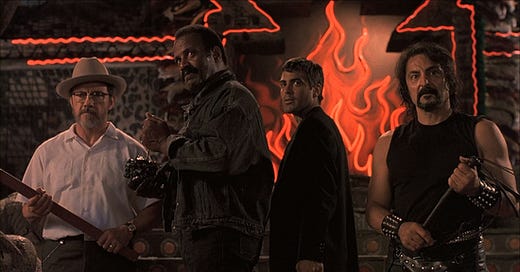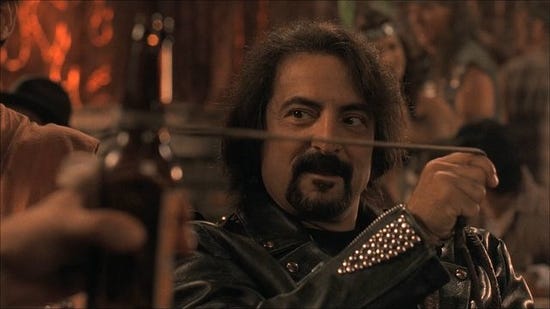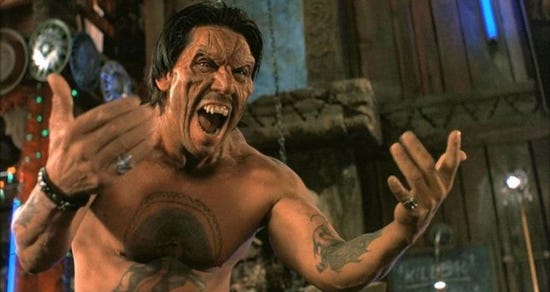Class of 1996: 'From Dusk Till Dawn'
In the “Class of …” series, we take a monthly look back at films celebrating either their 20th or 30th anniversary of initial release this year — six from 1986 and seven from 1996 (the extra in December’s double-feature column). The rules: No Oscar nominees and no films among either year’s top-10 grossers.
A nearly equal mixture of hostage dramatics and vampire kills, “From Dusk Till Dawn” sizzles like a capsaicin-spiked grindhouse meatloaf baked and served just under the wire of its sell-by date.
Released in 1996, “Dawn” first arose years earlier – long before co-writer / co-star Quentin Tarantino’s inimitable flair for verbal and visceral whiplash gained critical acclaim and commercial viability.
Tarantino needed a believable severed-ear effect for a key torture scene in 1992’s “Reservoir Dogs.” Effects man Robert Kurtzman sought a scribe to develop his idea about a vampire siege at a Mexican bar. Thus, a tit-for-tat partnership was born. (Kurtzman is the “K” of K.N.B. EFX Group, which handles the effects here; the “N” is Greg Nicotero, now an Emmy-winning creative honcho on “The Walking Dead” and the “B” is Howard Berger, whose makeup work has won an Oscar, and both men cameo here.)
Tarantino stepped out of the director’s chair to focus on his performance and work with Robert Rodriguez – coming off “Desperado,” the big-budget remake of his calling-card film, “El Mariachi,” and with whom Tarantino later reteamed over a decade later for “Grindhouse.” Rodriguez’s visual virtuosity is full-tilt here, including a for-the-ages bid of characters casually sauntering away from an explosion.
“Dawn” remains the most playful, puerile and palatable indulgence of Tarantino’s pure-id instinct – a palate-cleansing pause before the (mostly) prestigious projects he pursued post-“Pulp Fiction.” Its very title riffs on the notion of nightlong indulgences of schlock cinema at dusty drive-ins of bygone eras.
Its proximity to the next year’s “Jackie Brown,” still Tarantino’s most muted and mature work, seems especially hilarious … until you consider there’s enough substance – by way of sibling squabbles and self-doubting characters – to sustain the creature-free first half. (Imagine if, say, Chris Pine and Ben Foster’s characters in “Hell or High Water” arrived to rob the main bank branch and found a den of werewolves.)
If “Dawn” is two films neatly cleaved, a nigh-subliminal hum rumbles beneath the first one – in which fugitive bank robber Seth Gecko (George Clooney) and his degenerate brother, Richie (Tarantino), take hostage a meek preacher named Jacob Fuller (Harvey Keitel) and his kids (Juliette Lewis and Ernest Liu) in their RV. The Geckos’ latest robbery has left more than a half-dozen dead in Abilene, and they’ll need reasonable cover if they are to make it to Mexico. There, salvation awaits at El Rey – a permanent oasis for felons on the lam at the reasonable rate of 30% of the take.
This all sounds like a superfluous way to stretch things out until the supernatural selling point when hell literally breaks loose. You’re probably already picturing the “Straw Dogs”-ish ways in which milquetoast Jacob rises up to retaliate. But that’s not really what happens.
Instead, through directorial patience, slow-burn tension and ideological discourse that still packs a pulpy wallop, “Dawn” positions Seth and Jacob’s respective blind spots for control and independence as major vulnerabilities on which vampires will soon feast along with all that flesh.
Seth Gecko hardly represents Clooney’s best movie role, but he’s a rough-and-tumble forefather to the fearless idiosyncrasies indulged by an actor whose occasional flirtations with matinee-idol blandness have been mercifully brief. (Flame tattoos licking his neck and arms, Seth is an immediate visual antithesis of Dr. Doug Ross, the clean-cut lifesaver and ladykiller Clooney played then on NBC’s “ER.”)
He’s never at a loss for a cool quip about the freedoms he enjoys or a heated threat to quickly calm insurrection. But Seth’s broad shoulders slump under the weight of what it truly means to have unleashed his sociopathic sibling upon the world.
Early on, we see fast, horrifying flashes of the quick, brutal work Richie makes of a female bank teller held hostage while Seth is out grabbing burgers for everyone. To Richie, sexual violence is what he thinks a badass should indulge. It is, of course, a reprehensibly brute-force misinterpretation of Seth’s ethos that the world is his, Richie’s irreversible outlet to enjoy the take-charge jolt that comes so naturally to Seth. In the moment that Seth stumbles upon this grisly scene, Clooney’s face scans both a love for Richie and a lament for the lousy example he has set. It’s a crack in their sibling dynamic that widens into a chasm as the movie goes on.
Tarantino has clear limits as a performer, but Richie is also more appropriately loathsome than he may have been in the hands of any other actor. Without any image to uphold in front of the camera, Tarantino is unafraid to let us hate Richie unabashedly. (Nor does Clooney try to trick us into liking Seth; the undercurrent of self-loathing when he threatens to sic Richie on another woman later doesn’t hide that the words still made the leap from mind to mouth.)
Then there’s Jacob, a man of emotional restlessness and spiritual resignation over the religion he feels has failed him. Like Al Pacino, Keitel is rarely a performer who retreats within himself, and especially not when paired with Tarantino. But Jacob evolves into one of Keitel’s more strangely moving characters – quiet and reserved yet resolute in both a severance from faith and a rowdy recommitment to it at the hands of vampires.
Jacob has pulled up roots with daughter Kate (Lewis, herself playing against type as a plain-Jane not long after “Natural Born Killers”) and son Scott (Liu) after the death of his wife in an automobile accident. “Those acts of God really stick it in and break it off, don’t they?” Seth says upon learning it was the result of brakes Jacob didn’t think were that bad.
Jacob may still believe in God, but he no longer loves Him. This is no lapse, he says, but an awakening to the existence of life’s harshest realities – one he believes his kids would also do well to understand. (Interestingly enough, Tarantino initially wrote the climactic “Ezekiel 25:17” speech uttered by Samuel L. Jackson in “Pulp Fiction” for Jacob in this film, and it would certainly fit in that context.) Waltzing unexpectedly into a haven of bloodsuckers tends to help kids grow up fast.
Across the entirety of the first half, Clooney and Keitel engage in compulsively intriguing give and take. Seth demands that Jacob respect his pursuit of freedom from the law in the way he respects Jacob’s determination to escape from a religion under whose thumb he felt trapped. And while they never really, truly come to blows, their clash gives its own current of suspense to the usual narrative trappings – a tense border crossing, threats against the kids if Jacob doesn’t comply, etc.
(Adhering to the schlock quotient, Tarantino tosses in a smoke bomb of sensational-media satire – including a scene with Kelly Preston as a reporter using a high-smile voice to recount the Geckos’ spree and a death toll dolled up with flashing lights and sound effects like a midway ride at a carnival of souls.)
As for the kids, Scott largely exists to symbolically foreshadow the second-half shift with his “Precinct 13” T-shirt. But Tarantino and Rodriguez are careful to empower Kate – the subject of so many disgusting male leers in the first half – in the right ways during the second half.
Once the Geckos and Fullers make it into Mexico, they head to the Titty Twister – an all-night bar whose neon sign makes no bones about it. Like a one-building Vegas Strip powered by torchlight and putrid impulses, this is the place where the Geckos’ contact intends to meet them in the morning light and take them to El Rey. The interior décor? Best described as Mesoamerican Mad Max. The bartender? Played by Danny Trejo, he of born-45 face and bone-quaking brawn. The doorman? He’s one of three characters portrayed by Cheech Marin, this one hawking a buffet of “pussy” outside the front door.
At first, the Titty Twister merely seems like a salacious, rough-and-tumble place to ride the night out in a sweat-crusted funk – somewhere that will, at worst, corrupt the impressionable Scott. Salma Hayek delivers a persuasively seductive dance as Santanico Pandemonium, “the goddess of all beauty,” allowing Richie to slurp booze from her toes (and Tarantino to act on his career-long visual fetish for feet).
A guy named Sex Machine (Tom Savini) cracks a whip to snag beers from the hands of unsuspecting patrons. If they cross him, they’ll have to answer to the crotch gun he wears.
But once the Geckos cross too many lines of provocation, the regulars reveal themselves to be a vampire horde – feasting on truckers, bikers and ne’er do wells lured by writhing women and cheap tequila. Tarantino and Rodriguez unleash a double-barrel buckshot blast of well-choreographed chaos – all mushy flesh, staked hearts, melting bones, decapitated heads, popped eyes and ripped throats. Even the house band’s guitars morph into bloated corpses that seem stretched out by Luciferian luthiers. (“Now, let’s kill that fucking band!” Sex Machine shouts after helping dispatch the first vampiric wave.)
One would think a place run by vampires might invest in cheaper, plastic tables and chairs rather than So. Much. Wood. that can quickly be fashioned into weapons that vanquish them. Then again, they’ve likely never run into a pair of people so desperate to prove their self-worth as Seth and Jacob.
Zeroing in on Seth and Jacob’s weaknesses in the first half establishes key questions for each of them once the shit hits the fan. Will Seth cast aside his fruitless love for an irredeemable soul like Richie if it means saving others? Will Jacob embrace his power as “a mean, motherfucking servant of God” to strike down a literal manifestation of the random evil that has already robbed him of so much?
How upset one man gets when a vampire unexpectedly bites the other is indicative of the strength in the ass-stomping communion forged between them. Plus, toward the end, Keitel utters an all-time howler of a line with an unassailably straight face. The comic timing is explosive, but it arrives with the concussive context that, again, Jacob is helping his kids remember the hard bargains life will drive.
This is the sort of movie in which the load could blow early, but Tarantino and Rodriguez’s refractory period is impressively brief and they spiral the circumstances even further out of control in unexpected, creative ways. As their rogue’s gallery succumbs bit by bit (or bite by bite), the prosthetic effects of vampire metamorphosis macabrely elongate their actors’ faces like the heavies in Warren Beatty’s “Dick Tracy” on shrooms. (Special props to Blaxploitation legend Fred Williamson, whose eyes work overtime through all the latex to deliver believable frights and bloody punchlines.)
Savini, himself a horror-makeup hall of famer, also proves a comic force of exaggerated yuks and ethereal subtlety. Sex Machine like a dirtbag Errol Flynn forced to do his thing on dive-bar pool tables. In a world rife with needless cinematic universes, why not a “Chronicles of Sex Machine” prequel? And Tarantino’s script is playful with both the parameters of vampire folklore and the characters’ occasional remarks upon the outsized insanity of the movie’s idea without growing cheeky or meta.
Even if many of these makeshift heroes are fated to fall, they’re going to go out with fury and the final reel doubles down on disgusting animatronic creatures for them to fight – especially when one poor, turned soul sheds fleshly trappings to become what looks like a larger-budgeted version of the Sumatran rat-monkey from Peter Jackson’s “Braindead.”
The butane-veined charge of “From Dusk Till Dawn’s” second half is a far, far cry from the garrote-wire tension with which it starts out. But view the vampire segment as an inevitable breakdown of the characters’ belief systems – and a test of their mettle – and it’s easy to see the film as skillfully sophisticated junk.





